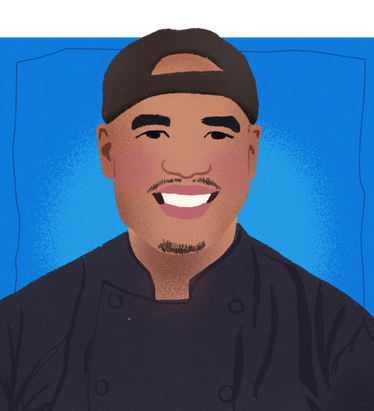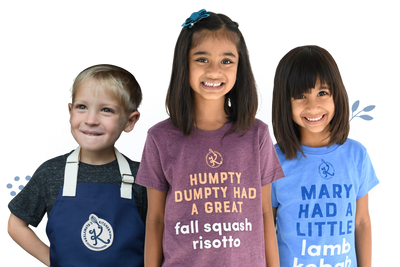
Taste Bud Profile
Tu David Phu

Growing up, Chef Tu didn’t grow up with an abundance of food on his table. Some of his earliest memories are of his mother’s resilience and resourcefulness in finding ways to feed her family. He remembers feeling joy and comfort through food, which has translated into his professional desire to feed and educate others who might themselves experience food-insecurity.



Tu David Phu: "I think a lot of the time when people talk about their food memories, they’re talking about times of abundance—holiday food, full Thanksgiving or Christmas tables, things like that. For me, my earliest memories of food stem from the fact that I grew up in a food-insecure home, in poverty. When food—any food—landed on the dining table, I genuinely appreciated it. My mother would go to the local butcher, where you could get discarded chicken bones for free. When we didn’t have the resources to feed ourselves, she’d go gather these bones and make a simple broth with them. We seasoned it with a little fish sauce, and ate that broth with rice. I have memories of sucking on those bones for any bit of meat left—and I think now when I tell this story, people automatically think “that’s so sad.” It’s probably hard for people who didn’t grow up insecure to understand the feeling that I had, which was one of absolute joy. Going hungry is very emotional.

Putting something, anything, in your stomach brings you joy when you’re hungry. It’s black and white. Having food in your stomach is one of the most primal “good” feelings there is.
Both of my parents suffered from PTSD from the war in Vietnam. Life was difficult and sparse in lots of ways, but in my youth, eating was one of the few things that always offered me a good emotional experience. The chicken bones that my mom gathered symbolized to me that food is precious, and a beautiful, wonderful thing. I had shame about our poverty growing up, but now I look back and I see the extent to which my mother would go to put food on the table, and it’s empowering. It speaks to my mom’s resilience, and her ingenuity. Food is symbolic in different ways to all of us.

I think my desire to make food into my life definitely stems from that food insecurity and also from my parents’ PTSD. When you experience war and famine, you don’t know what tomorrow is going to bring. You don’t know when your next food ration will come. It’s instinctive to my mom. For example, if someone gives her a box of cookies or chocolates, she’ll hide them, because she wants to enjoy them later and has it ingrained in her mind that someone could take them away from her. My father now overeats. He eats as much as he can in one sitting—I’m not projecting any blame or shame, I’m pointing out that when people face food insecurity, and particularly when it’s imposed by war, your mind and body are always in survival mode. I’ve recently reflected on how it affected me. When family members who were more financially secure than we were would host parties, I’d be the kid constantly coming back to the table and eating as much as I possibly could. It embarrassed my parents. I didn’t recognize it then, but of course that was an issue and a reaction to my own food insecurity, and constantly seeking the good feeling that came with being full. The way hunger impacted me from youth til now is really why I got into the food space, professionally.

I started working in community spaces and nonprofit organizations, from rehabilitation programs to Asian health services and everything in between. You hear so many stories, and start to interact with people from different disciplines and professions, specifically healthcare. I started to hear how so many people from so many different backgrounds shared so much through their experiences of insecurity—and I became a beneficiary of so much knowledge from the healthcare professionals there to help in the same spaces I wanted to provide help for.
I became a chef because I know how much joy and emotion food can bring someone. Feeding someone can bring them happiness in its simplest form. People sometimes ask me why I’m not in the restaurant space these days, and the honest answer is that in my food experiences, I’ve always felt unseen in restaurants. I have nothing against fine dining. I enjoyed cooking in those spaces, but it just wasn’t me. I go to those spaces now to help provide narrative, to help advise, to maybe help with storytelling. I feel very deeply about the power of food and how it can affect us and our communities, and it goes beyond restaurants, to youth community centers to rehabilitation and incarcerated communities and beyond.

I never want kids to be ashamed of what they eat. With Kalamata, I see this pride, this ownership—this celebration of what she eats, and of her identity. I love that she’s celebrating herself and that there’s space for that. A kid with a different heritage can still look at her and say, “I can do that with myself too”. That’s the beautiful part. If I had known a character like Kalamata in my youth, I think I would have felt more proud and appreciative of the food my parents put on our table. Maybe I wouldn’t have felt weird or ashamed that I didn’t eat the same things that everyone else ate. Every kid wants to feel like they belong in a group— maybe Kalamata could have helped all of the kids feeling unseen know that there was space for them too."

